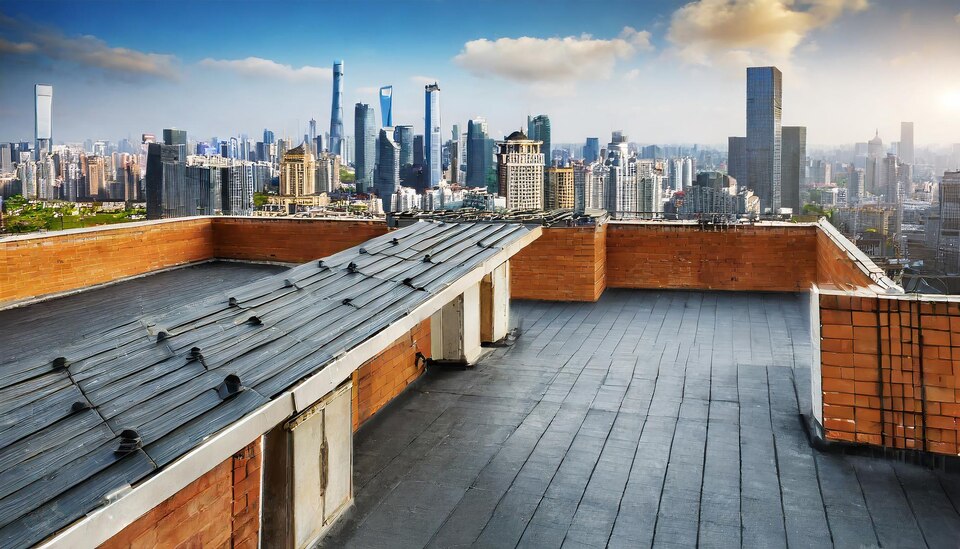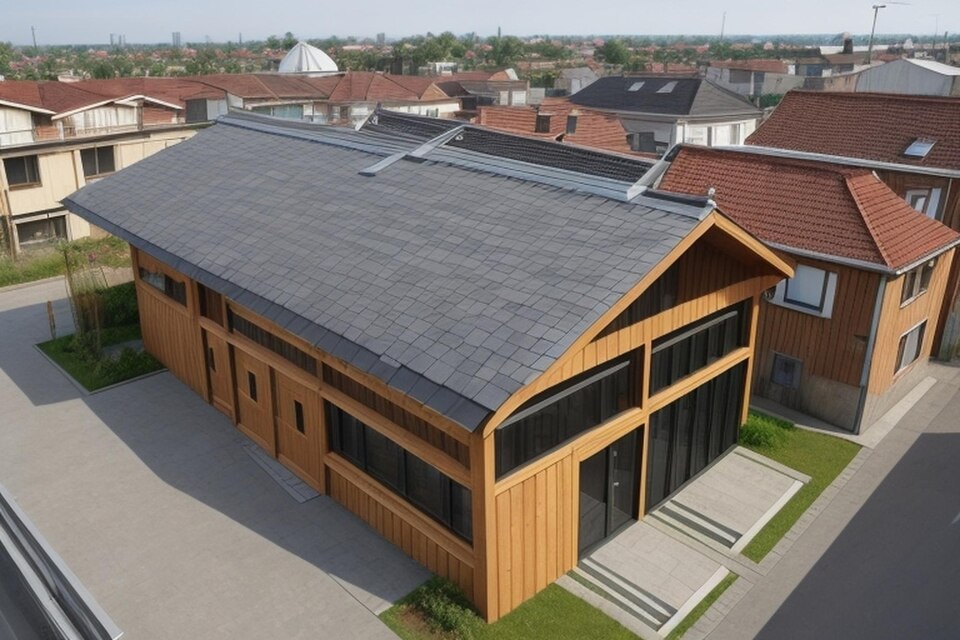What Are Flat Roofs Made Of?
Flat roofs, despite their name, aren’t perfectly flat. They have a slight pitch, usually between 1/4 to 1/2 inch per foot, to allow for water drainage. This subtle slope is essential, it prevents water from pooling, which could lead to leaks and structural damage. These roofs are a common sight in commercial buildings, but they are also found in residential architecture, particularly in modern designs.
Flat roofs offer a unique set of advantages, including cost-effectiveness and the possibility of utilizing the roof space for various purposes, such as gardens or patios. Choosing a flat roof can be a major space saver. The materials used to construct these roofs have evolved, with modern technology providing durable and long-lasting options.
Let’s explore the basics of flat roofs and what they are made of.
Understanding the Basics of Flat Roof Construction
The construction of a flat roof involves several layers, each serving a specific purpose. The primary goal is to create a waterproof barrier that can withstand the elements. This is achieved through a combination of materials, carefully selected and installed to provide maximum protection. Think of it like building a layered cake, each layer is important.
- The Deck: This is the structural foundation of the roof, typically made of materials like concrete, wood, or metal.
- Insulation: This layer helps regulate temperature and improve energy efficiency.
- Waterproofing Membrane: This is the most critical layer, preventing water from penetrating the roof.
- Vapor barrier: This layer is important to control moisture.
The selection of materials for each layer depends on various factors, including climate, budget, and the intended use of the roof. It also depends on your individual needs.

Common Materials Used for the Waterproofing Membrane
The waterproofing membrane is the star of the show when it comes to flat roofs. This layer is directly exposed to the elements and must be incredibly durable and resilient. Several materials are commonly used for this purpose, each with its advantages and disadvantages.
- Built-Up Roofing (BUR): This traditional method involves multiple layers of asphalt-impregnated felt, alternated with hot asphalt or tar. The top layer is often covered with gravel or mineral granules to protect it from UV radiation.
- Modified Bitumen: This is a modern evolution of BUR, using reinforced asphalt sheets that are either torch-applied, self-adhered, or installed with hot asphalt.
- Single-Ply Membranes: These membranes come in large sheets, reducing the number of seams, which are potential weak points.
Apex Commercial Roofing LLC also offers Metal Roofing, Silicone Roofing, and Rubber Roofing for the NJ, NY, and PA areas. Our dedicated team specializes in tailored roofing solutions to ensure the longevity and reliability of your commercial roof. Contact us today at 1 800 231-2941 or 1 856 203-6108 to learn more about our roofing options.
Delving Deeper into Built-Up Roofing (BUR)
Built-Up Roofing, often referred to as “tar and gravel” roofing, has a long history. It’s a tried-and-true method that has been used for over a century. The process involves layering asphalt-soaked felt sheets, much like building up layers of protection. The final layer of gravel or mineral granules helps protect the underlying layers from the sun’s damaging rays.
Although an older system, BUR offers good fire resistance. The multiple layers can offer a degree of redundancy, meaning that if one layer fails, the others can still provide protection. This is one of its main benefits.
Exploring Modified Bitumen Roofing
Modified Bitumen represents an advancement over traditional BUR. It uses asphalt sheets that are reinforced with polymers, improving their flexibility and strength. You have various installation options, including torch-applied, self-adhered, and hot-mopped systems.
- Torch-Applied: A torch is used to melt the underside of the membrane, bonding it to the substrate.
- Self-Adhered: These membranes have a pre-applied adhesive that bonds to the substrate when pressure is applied. *Hot Mopped: Similar to a BUR System
Modified Bitumen roofs are known for their durability and resistance to tearing and punctures. The reinforced nature of the material makes them a reliable choice for many buildings. They also provide a good balance between cost and performance.
Examining Single-Ply Membranes: EPDM, TPO, and PVC
Single-ply membranes offer a modern approach to flat roofing. Because they come in large sheets, there are fewer seams, this minimizes the potential for leaks. Each type of single-ply membrane has its unique properties.
- EPDM: Often referred to as “rubber roofing,” EPDM is known for its exceptional durability and resistance to weathering. It can withstand extreme temperatures and UV exposure, making it a popular choice in various climates. It’s also relatively easy to repair, and if you’re searching for EPDM roofing repair near me, there are many professional services available to help restore and maintain your roof’s integrity.
- TPO: TPO membranes are known for their energy efficiency. Their reflective surface helps reduce cooling costs. They are also resistant to chemicals and punctures, making them a suitable option for commercial buildings. This type of membrane can be a great investment.
- PVC: PVC membranes are exceptionally strong and durable. They offer excellent resistance to fire, chemicals, and punctures. This makes them a reliable choice for demanding applications. They are also highly reflective, contributing to energy savings.
Factors Influencing Material Choice
Several aspects can determine the best material for your flat roof. Climate plays a significant role. Areas with extreme temperatures or heavy rainfall may require more robust materials. The intended use of the roof is another consideration. A roof that will be used as a deck or garden will need a membrane that can withstand foot traffic and additional weight.
Budget is always a factor. Some materials are more expensive than others, but it’s important to consider the long-term cost of ownership. Durability and maintenance requirements can significantly impact the total cost over the lifespan of the roof. Proper installation is the key to a long lasting roof.
Maintenance and Longevity of Flat Roofs
Regular maintenance is essential for maximizing the lifespan of any flat roof. Inspections should be performed at least twice a year, and after any severe weather events. You should address small issues promptly to prevent them from escalating into larger, more costly problems.
Cleaning debris, such as leaves and branches, is important. This prevents water from ponding and potentially damaging the membrane. Checking for signs of wear and tear, such as cracks or blisters, is also a crucial step. Catching and fixing issues early helps prevent further damage.
Don’t forget, if you are experiencing flat roof leaks or other issues, contact Apex Commercial Roofing LLC. We offer emergency roof repair in Apex 24/7.
What are Flat Roofs Made Of?
Flat roofs are complex systems composed of multiple layers, each designed to contribute to the overall performance and durability of the roof. The waterproofing membrane is the most critical component, protecting the building from the elements.
The choice of material for this membrane depends on various aspects, including climate, budget, and the intended use of the roof. Understanding these materials and their properties is essential for making informed decisions when building or replacing a flat roof.
Remember, the most important aspect of a flat roof is the quality of installation to its proper specifications. Remember, if you’re looking for information on what flat roofs are made of, considering all your options is extremely important.Trust Apex Commercial Roofing LLC with your flat roof needs. We proudly serve the New Jersey, New York, and Pennsylvania area. Come see us 811 Church Road, Cherry Hill, NJ 0805.
Visit Apex Commercial Roofing LLC at Our Cherry Hill Location
811 Church Rd #105,
Cherry Hill, NJ 08002,
United States
For professional roofing services, including commercial roofers, commercial metal roof repair, we invite you to stop by or reach out to us.







